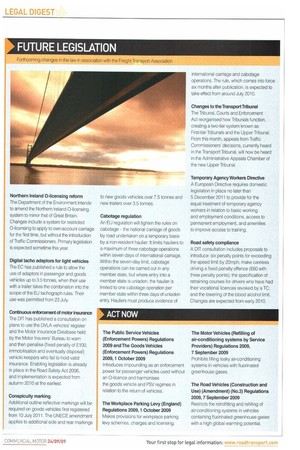Northern Ireland 0-licensing reform The Department of the Environment intends
Page 22

If you've noticed an error in this article please click here to report it so we can fix it.
to amend the Northern Ireland 0-licensing system to mirror that of Great Britain. Changes include a system for restricted 0-licensing to apply to own-account carriage for the first time, but without the introduction of Traffic Commissioners. Primary legislation is expected sometime this year.
Digital tacho adaptors for light vehicles The EC has published a rule to allow the use of adaptors in passenger and goods vehicles up to 3.5 tonnes, when their use with a trailer takes the combination into the scope of the EU tachograph rules. Their use was permitted from 23 July.
Continuous enforcement of motor insurance The Dfl has published a consultation on plans to use the DVLA vehicles' register and the Motor Insurance Database held by the Motor Insurers' Bureau to warn and then penalise (fixed penalty of 2100, immobilisation and eventually disposal) vehicle keepers who fail to hold valid insurance. Enabling legislation is already in place in the Road Safety Act 2006, and implementation is expected from autumn 2010 at the earliest.
Conspicuity marking Additional outline reflective markings will be required on goods vehicles first registered from 10 July 2011. The UNECE amendment applies to additional side and rear markings to new goods vehicles over 7.5 tonnes and new trailers over 3.5 tonnes.
Cabotage regulation An EU regulation will tighten the rules on cabotage the national carriage of goods by road undertaken on a temporary basis by a non-resident haulier. It limits hauliers to a maximum of three cabotage operations within seven days of international carriage. Within the seven-day limit, cabotage operations can be carried out in any member state, but where entry into a member state is unladen, the haulier is limited to one cabotage operation per member state within three days of unladen entry. Hauliers must produce evidence of international carriage and cabotage operations. The rule, which comes into force six months after publication, is expected to take effect from around July 2010.
Changes to the Transport Tribunal The Tribunal, Courts and Enforcement Act reorganised how Tribunals function, creating a two-tier system known as First-tier Tribunals and the Upper Tribunal. From this month, appeals from Traffic Commissioners' decisions, currently heard in the Transport Tribunal, will now be heard in the Administrative Appeals Chamber of the new Upper Tribunal.
Temporary Agency Workers Directive A European Directive requires domestic legislation in place no later than 5 December 2011 to provide for the equal treatment of temporary agency workers in relation to basic working and employment conditions, access to permanent employment, and amenities to improve access to training.
Road safety compliance A DfT consultation includes proposals to introduce: six penalty points for exceeding the speed limit by 20mph; make careless driving a fixed penalty offence (EGO with three penalty points); the specification of retraining courses for drivers who have had their vocational licences revoked by a IC; and the lowering of the blood alcohol limit. Changes are expected from early 2010.












































































































































